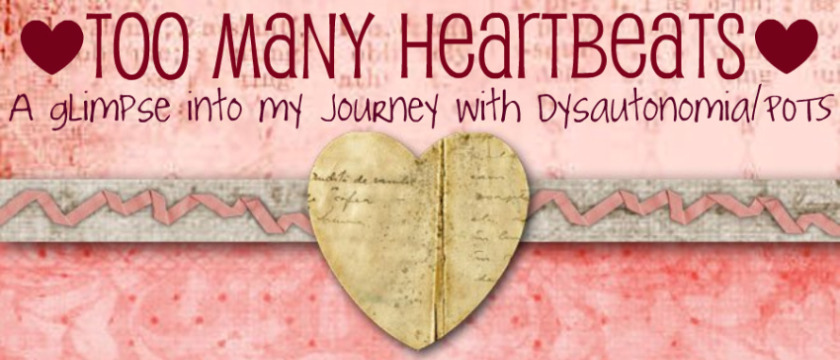In the meantime, here is a re-post of a post/article that is really important to me and was well received the last time I posted it. I hope you enjoy it and I hope it is seen by a lot of people who have not seen it before.

I saw the following article on the Invisible Illness Awareness Week website and it really struck a cord with me. The biggest reason is because I used to be extremely passionate about people who parked in those designated parking spaces but, in my ever-so-holier-than-thou-professional-medical opinion, surely did not need them! HA! What does that Proverb say?? 'Pride goes before the fall'?? Yeah, that's it.
Since I know this is a very sensitive subject for us all, I thought I would post (with permission) this great article. I hope that it will help EVERYONE to think twice the next time you see someone parking in one of those precious parking spaces who may not 'look' as though they 'need' to. Disabilities come in lots of different shapes and forms as do those who have them. Many are invisible to the untrained AND the trained eye. It is simply impossible to know if someone is truly disabled just by looking at them. Here's that amazing article:
CAN THOSE WITH AN INVISIBLE ILLNESS
PARK IN A BLUE SPOT WITHOUT OTHERS SEEING RED??

“Do you know the fine for using someone else’s handicapped parking permit is $300?” “That parking spot is saved for the disabled! You should be ashamed of yourself!” Nearly everyone with an invisible illness has been told, “You don’t look disabled to me!” One of my friends replied, “Well, you don’t look stupid to me.” I just bite my lip to try to prevent the tears from forming, broken-hearted that I appear to be deceptive, when I would do anything to give back this parking perk that I use on a rare occasion.
As I circle the parking lot a fourth time on this day I hope for a spot to open up within two-hundred yards of the store, but there is nothing remotely close at this bustling superstore where I need to buy my prescriptions and milk for my toddler. My rheumatoid arthritis is flaring badly, causing extra fluid in my knees to dislocate pieces of loose bones. Every step is painful and unpredictable.
Finally I sigh in resignation and pull into the farthest “blue parking spot.” I reach for the placard–the one that has a bold white symbol of a wheelchair–and no, I don’t have a wheelchair–yet. So after fifteen years of having this “privilege” at my disposal I still warily scan the area before reluctantly dangling the placard from the rear view mirror. Is there anyone watching, wondering, or waiting, ready to confront me?
I’ve had scathing notes left on my windshield and many people, empowered by television exposés, have approached me with their opinions. Judgmental expressions and whispers sting just as much. My husband and I adopted a baby and when I would get my child out of the car I would avoid eye contact with onlookers because I could hear their whispers of, “She’s not disabled! Or–if she is–she has no right to have a child!”
Nearly 1 in 2 Americans (133 million) live with a chronic illness. It could be diabetes, cancer, cystic fibrosis, fibromyalgia or even chronic back pain. Many illnesses make walking long distances impossible because of limited lung capacity, physical pain, or unpredictable numbness in the legs. According to statistics provided by the U.S. Census Bureau, about 96% of these illnesses are invisible. There is no sign of the illness existing, nor the use of an assistive device like a cane or a wheelchair.
I began National Invisible Chronic Illness Awareness Week in 2002, which is held annually in September, after witnessing thousands of people who had frustrations, fears, loneliness, and bitterness, about feeling invalidated. One’s illness, age, diagnosis, or level of disease degeneration, doesn’t change the emotional pain.
Strangers and loved ones alike doubt the severity of our illness or even the diagnosis. We’ve heard, “You look so good! You must be feeling better.” But we don’t feel better. We just bought some fake tan in a bottle and pasted on a smile.
National Invisible Chronic Illness Awareness Week is a time to acknowledge that invisible illness is more prevalent than we’d imagine and everyone–both those who are healthy and ill–can make a difference by encouraging someone with an invisible illness, rather than tearing someone down.
Are those parking spots painted blue because they give so many people the blues? That small area of square footage is a breeding ground for many frustrations as we are forced to defend our illness and character to total strangers. I’d gladly trade in my placard indefinitely for just a week of having my old body back when I could run, sit on the floor, or even hold a fork without tendons popping out of place.
I anticipate the day when a nationally designated system is formed. Texas law states that blue placards are for those who use assistive devices; red permits are for people with a “condition that impairs mobility.” In other states, red symbolizes six months of disability and blue is permanent. It’s confusing! And for one with invisible illness, the wheelchair symbol discredits both our physical pain and–in the eyes of others–our reputation. Until then, we rely on Invisible Illness Week bumper stickers.
The next time you see a healthy looking man loading groceries into his car–parked in the “blue spot”–don’t glare. Stop and offer to help him, or just smile nicely, giving him the benefit of the doubt. Seventy percent of suicides have uncontrollable physical pain as a factor. Your smile may save his life. At the least, it will astonish him, perhaps providing him with genuine encouragement he hasn’t felt for months.
To find more articles and overall support while living with a chronic illness and/or pain, please visit The Invisible Illness Awareness Website or Rest Ministries! Lisa Copen is the director of Rest Ministries, author of 'Beyond Casseroles: 505 Ways to Encourage a Chronically Ill Friend' and founder of National Invisible Chronic Illness Awareness Week.
























































8 comments:
Oh, my! I hope you get it figured out. Our crazy next door neighbor where we used to live had a handicap sticker, but then she'd be out in the yard doing heavy yard work! I felt a little bad when my sister suggested the lady may have had a closed head injury when she was in an accident. You never know people's circumstances!
I remember this article well because since I last read it I had the un/fortunate task of coming to the aide of a woman being harassed by another shopper for parking in a blue spot. She was trying to explain that she had rheumatoid arthritis in between the man's yelling. This article made me bold. I told him he had no right to pass judgement then asked him if he was a doctor with super x-ray vision to see inside her body and know she was not sick. He walked away in a huff and I stood there shaking because I am not a confrontational person at all. The lady could not stop thanking me and I told her I had a friend who taught me all about invisible illnesses. :-)
Wishing you well on your doc visits and hoping you get the answers you seek.
Praying for you, Teresa! And for your doctors!
Thanks for reposting this! Excellent reminder!
I am so sorry you are feeling so bad. I hope you have some answers this week.
What a great article. I must have missed it the first time.
I use the blue card nearly everyday. I work with the elderly and most of them have one.
I have gotten a few looks but as of now no one has ever said anything.
I will continue to pray for you.
Thinking of you Teresa! I see you still have your courage and determination! I'm going to friend you!
Be on the lookout for a friend request from Judy Harper.
Hi Teresa,
I am praying for you , I hope you are feeling better. I understand you are not able to visit other blogs . :)
This post is very meaningful for me although I don't have a handicap placard ,I do have more than one invisible illness. I suffer from high blood pressure,fibromyalgia & Irritable Bowel Syndrome. My life can be pretty miserable at times . But when I am feeling well and out , most people I know just think that is nothing much wrong with me. They don't see the days I don't make it too much further than the couch.
Love & Prayers
~Myrna
Teresa, how are you doing?
Post a Comment